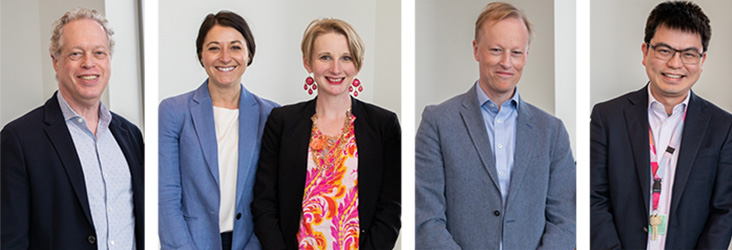2023 Spark Grant Awards Announced
Written by: Jacqueline Mitchell
MAY 26, 2023
Six Multi-Disciplinary Projects Designed To Spur Innovation To Receive Seed Funding
Spring and new beginnings were in the air when the 2023 Translational Research Hub Spark Grant Awardees were announced at the first annual spark awards showcase on May 11. The event was held on a light, bright afternoon in the 11th floor conference room of Beth Israel Deaconess Medical Center’s (BIDMC) new Klarman building.
“We’re here today to recognize our incredible community of scholars and celebrate research innovation at BIDMC,” said Gyongyi Szabo, MD, PhD, chief academic officer for BIDMC and Beth Israel Lahey Health, in her introductory remarks. “The Spark grant showcase is an opportunity to celebrate not only our Spark award recipients, but the community of mentors, colleagues, staff, and collaborators that you have created as part of the process.”
Structured to encourage innovative, interdisciplinary translational research, the Spark Grant Awards were introduced in 2022 as part of BIDMC’s five-year Institutional Strategic Plan for Innovation, Research & Education (InSPIRE) designed to reimagine and support a modern, vital research enterprise rolled out by Szabo in 2020.
Six projects were selected to receive $50,000 each in research support. Four projects pull expertise from the two established translational research hubs, Pathogens, Immunity, and Inflammation and Systemic Effects of Metabolic Disease, and two will fall under the auspices of the Neuroscience Connections hub, slated to be launched later this year.
The 2023 Translational Hub Spark Grant Awardees

The Spark grants are designed to bring basic and clinical scientists together, to pair senior and junior faculty and to orchestrate meetings of the minds across fields of expertise.
“Applying for the Spark grant forced me and my collaborators to think a bit more creatively about how to combine both clinical and basic science data sets so that we could...use the clinical and basic data sets synergistically so they complement one another,” said Megan E. Rosa-Caldwell, PhD, an instructor in the department of Neurology at BIDMC, who is part of the multidisciplinary team studying how a signaling molecule made in muscle tissue may play a role in the brains of people with eating disorders. “The nice thing about this grant is that it should allow us to provide some key data that will hopefully let us obtain some larger funding for both clinical research and basic research in the near future.”
Because it is intended to foster innovative ideas, the Spark grant also allows teams of investigators to take on projects that are riskier and that would be difficult to fund through more traditional funding mechanisms, the scientists say.
“Without the Spark grant, I would not have been able to easily get this line of investigation started, as for traditional NIH grant funding opportunities, preliminary data would be needed,” said Roeland Middlebeek, MD, an endocrinologist whose team will study mechanisms of increased obesity and type 2 diabetes in spinal cord injury. “The grant will allow me to work closely with the outstanding research core facilities at BIDMC, which are very helpful for the specific analyses I have planned in this project.”
“The Spark grant is a unique opportunity to build inter-disciplinary collaborations at BILH,” said Stephanie Buss, MD, an assistant professor in Neurology, whose team will use complementary approaches with genomics and brain stimulation to confirm which brain abnormalities are present in Alzheimer's disease. “The SPARK grant greatly accelerated our collaboration and will make our research much more impactful moving forward.”
Representatives from the 2022 awardees gave updates about the projects supported by grants they received last year. Among them, Ai-ris Collier, MD, and Alejandra Barrero-Castillero, PhD, described how the Spark Award supported their team as they created a data and biospecimen repository with which to study the timing and type of maternal vaccine that optimizes infant protection against several pathogens.
Abhigyan Satyam, PhD, presented his team’s work seeking a non-invasive biomarker of kidney disease, with 37 million Americans suffering from an autoimmune form of kidney disease called lupus nephritis. Satyam and colleague’s preliminary data indicate that characteristics of cells present in urine may be useful as a tool to monitor this disease.
Georgios Theocharidis, PhD, also presented updates to his team’s project, “Spatial Proteogenomics and Genetic Engineering of Fibroblasts for Enhanced Diabetic Wound Healing,” and Joji Fujisaki, MD, PhD, provided an overview of “Tolerance Against Normal and Malignant Stem Cells.”
“I believe this plan really puts us on a path towards increasing discovery, innovation and education in an environment where extraordinary and equitable patient care is a priority,” Szabo said. "The Spark grants are a key part of this strategic plan to maximize collaboration among researchers and clinicians while focusing on therapeutic areas that align with the needs of BIDMC’s patient population.”
About Beth Israel Deaconess Medical Center
Beth Israel Deaconess Medical Center is a leading academic medical center, where extraordinary care is supported by high-quality education and research. BIDMC is a teaching affiliate of Harvard Medical School, and consistently ranks as a national leader among independent hospitals in National Institutes of Health funding. BIDMC is the official hospital of the Boston Red Sox.
Beth Israel Deaconess Medical Center is a part of Beth Israel Lahey Health, a health care system that brings together academic medical centers and teaching hospitals, community and specialty hospitals, more than 4,700 physicians and 39,000 employees in a shared mission to expand access to great care and advance the science and practice of medicine through groundbreaking research and education.
